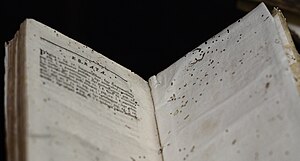Real Bookworms

A book showing damage from insect infestation (“bookworms”), on display at the Yale Medical School library (Photo credit: Wikipedia)
When you imagine a bookworm, you may imagine an intelligent, well-read student who always has his or her nose in a book. However, do you know where the term “bookworm” derives its meaning?
The term comes from actual insects, ones that are just as fond of books as many human beings are. In fact, these bugs are so smitten with literary pursuits that they gobble up every book in sight, literally. Bookworms and other related insects, such as furniture beetles, are just one of the many insects that devour tomes of both knowledge and fantasy.
Bookworms: Pests That Love Reading (and Eating)
Bookworms, also called “book borers”, are uncommon insects that literally eat their way through books, paper, and other hard materials. Because bookworms are known for their raging appetites, mostly directed towards books and other reading materials, it made sense for the term “bookworm” to be applied to those individuals who enjoy reading. People can have appetites for reading that are just as ravenous.
A more common, related pest is known as the furniture beetle. Also known as a borer, this insect ravages books, wood, and cloth, mostly in its larvae state. Adult furniture beetles do not feed; rather, they will lay eggs in wood so that their destruction will continue. Much like termites, these insects will often damage homes, and are much more common than bookworms.
How to Get Rid of Bookworms and Other Related Pests
First and foremost, bookworms, furniture beetles, and woodworms are best controlled by prevention measures. Keep openings in the home such as cracks in walls, windows, and doors, tightly sealed. If you observe new, small holes in wood or reading materials, contact a professional pest control service for advice quickly.
Some insecticidal applications may be used to control bookworms and other related pests. Sprays that are applied to the surface of wood, furniture, and other at-risk areas may reduce infestations. However, most sprays will only kill the adult borers, and not the developing larvae. Since the larvae are the insects that do the most damage, you may wish to consult a professional as to how to best reduce the numbers of these troublesome borers.


